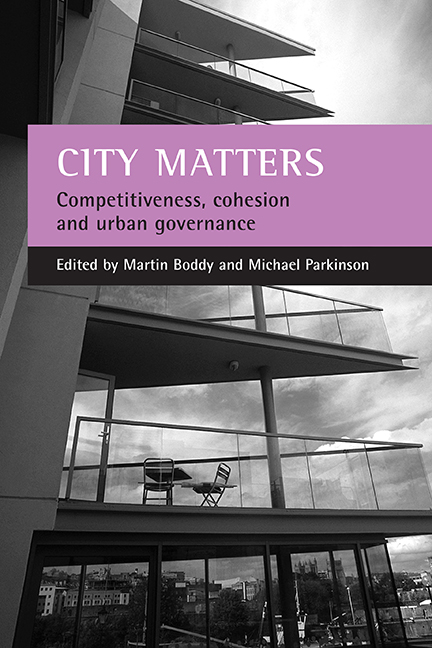Book contents
- Frontmatter
- Contents
- List of tables and figures
- Foreword
- Acknowledgements
- Notes on contributors
- one Introduction
- Part One Competitiveness, cohesion and urban governance
- Part Two Competitiveness and urban change
- Part Three Competitiveness, innovation and the knowledge economy
- Part Four Housing, property and economic performance
- Part Five Space, place and social cohesion
- Part Six Ethnicity, enterprise and social cohesion
- Part Seven Leadership, governance and social capital
- Conclusions
- Index
seven - Migration, residential preferences and the changing environment of cities
Published online by Cambridge University Press: 20 January 2022
- Frontmatter
- Contents
- List of tables and figures
- Foreword
- Acknowledgements
- Notes on contributors
- one Introduction
- Part One Competitiveness, cohesion and urban governance
- Part Two Competitiveness and urban change
- Part Three Competitiveness, innovation and the knowledge economy
- Part Four Housing, property and economic performance
- Part Five Space, place and social cohesion
- Part Six Ethnicity, enterprise and social cohesion
- Part Seven Leadership, governance and social capital
- Conclusions
- Index
Summary
Perhaps the feature of British cities that has been given the most consistent attention in recent years by the media and policy makers alike is population loss through migration to other parts of the country. Once seen in a positive light as a key mechanism for reducing urban development pressures and supported by policy initiatives such as the New Towns programme, the urban exodus has, for the past three decades, been viewed as one of the nation’s biggest planning challenges. This is clear, most recently, in the Urban White Paper and supporting documents setting out and supporting central government’s latest efforts at securing an ‘urban renaissance’ (Urban Task Force, 1999; DETR, 2000; Robson et al, 2000). Urban exodus is seen both as the haemorrhaging of human capital from cities and towns and as the source of pressures for growth and unacceptably high house-building requirements elsewhere. Stemming this tide is portrayed as a crucial factor in the success of urban regeneration policy, as well as potentially assisting the achievement of wider environmental sustainability objectives. Better intelligence about the dynamics of this phenomenon and the motivations of the people involved, therefore, is a vital element in deciding on the best approach to be taken towards reviving the social and economic life of our cities.
This chapter presents the findings of a ‘Cities’ programme project that aimed at improving our understanding of the factors that bind and attract residents to, and (not least) that repel people from, the nation’s larger cities and their inner areas. That project included aggregate analyses of population trends and migration patterns and investigations of social differences in migration behaviour and residential preferences. The chapter begins by examining the extent of a demographic renaissance in urban Britain, based on official population estimates and data on within-UK migration. It then probes the characteristics of people moving from, to and within Britain’s main conurbations, and goes on to look at the factors influencing people’s migration decisions, drawing principally on evidence collected in a case study of Newcastle upon Tyne. In the final section, it concludes that, while the extent of the urban exodus has not been significantly dented by policy interventions up to now, the analyses of migration behaviour reveal a number of promising signs.
- Type
- Chapter
- Information
- City MattersCompetitiveness, Cohesion and Urban Governance, pp. 111 - 128Publisher: Bristol University PressPrint publication year: 2004



